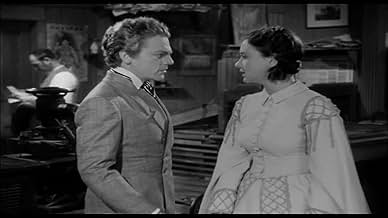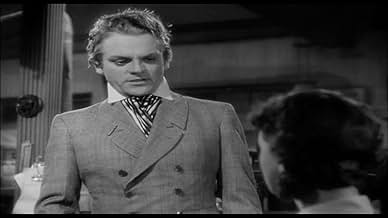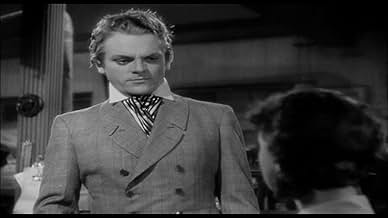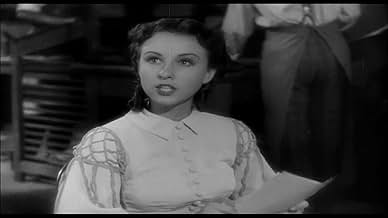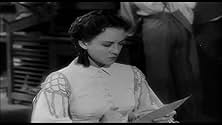After a roustabout sailer avoids being shanghaied in 1852 San Francisco, his audacity helps him to arise to a position of power in the vice industry of the infamous Barbary Coast.After a roustabout sailer avoids being shanghaied in 1852 San Francisco, his audacity helps him to arise to a position of power in the vice industry of the infamous Barbary Coast.After a roustabout sailer avoids being shanghaied in 1852 San Francisco, his audacity helps him to arise to a position of power in the vice industry of the infamous Barbary Coast.
- James Daley
- (as Joseph King)
- Slugs Crippen
- (as Joseph Sawyer)
- Drunk
- (uncredited)
- Director
- Writers
- All cast & crew
- Production, box office & more at IMDbPro
Featured reviews
Cagney in San Francisco
Director Lloyd Bacon and the crew do a good job in capturing and contrasting the various character types, especially in the opera setting. At the story's center, Cagney in introduced as a ruffian who becomes a well-dressed dandy. Resembling a young Liberace, the star manages to look both dapper and uncomfortable, in a series of flashy suits and extra tall top hats. It works for Cagney's tailor-made character...
There is an interesting hint at a romantic interest between Cagney and Mr. Stone. Just when you think you're reading too much into it, Mr. Bacon or one of the actors leads you astray. The two are very "hands on" throughout, even when Stone is ironing pants. Their last scene together has Cagney giving attractive newspaperwoman Margaret Lindsay (as Jean Barrat) a knowing look as he gives Stone an extra, more personal squeeze. In this scene, it seems like the baton is being passed to Ms. Lindsay. Apart from the subtleties and double takes, "Frisco kid" is ordinary but satisfying.
****** Frisco Kid (11/30/35) Lloyd Bacon ~ James Cagney, Margaret Lindsay, George E. Stone, Ricardo Cortez
Unsaintly San Francisco
The picturesque Barbary Coast setting is a plus, though, and this one's the first movie I've seen, that features a lynch mob whose anger you actually understand (though the people are portrayed just as sheepishly dumb as always.)
Not Cagney's best hour, to be sure.
5 out of 10 hooked hands
OK, but not great
More Story Than Runtime
The flick's typical WB from the period—fast, tough, and not too sentimental. Cagney's Cagney, a pint-sized dynamo if ever there was one. He's about as dominating a character as Hollywood has had and perfect for the part. The plot-line itself is not too plausible, but the spectacle does compensate. I wish more time was spent on the details of Bat's scheming and social climbing. After all, that was Cagney's movie appeal-- his lower class drive against all odds.
On the other hand, catch Ricardo Cortez as the one truly slick crook of the bunch. But what about Solly's (Stone) relationship with the domineering Bat. They're buddies, sure, but catch Solly's expressions when the two get close to one another. Too bad about the facile ending which is typical Hollywood of the Code period. Had the movie been made a pre-Code two years earlier, I wonder if the ending would have been the same.
All in all, the storyline is pretty disjointed, really needing a longer runtime for its networking and class themes to develop. There's also the anti-lynching element that doesn't really grieve— after all, the victims are hardly innocent. However, it's really crowd atmospherics and Cagney, that's worth catching up with. Anyway, I expect every extra in Hollywood got a welcome WB payday, along with a chance to shout their lungs out.
Better Than They Say.
You will not get bored. You will be hooked into the movie from the start and you will truly appreciate the work that went into this movie. The idea of it is pretty unique and it was not exactly easy to make a film set in such a time. 1850's. Imagine that. But don't be put off. There is a 1930s appeal. And you can see this being made in our modern times. There is also a gritty edge to the plot. Cagney is a sailor who was robbed and left for dead. He brilliantly comes back with a smart vengeance. And the other characters keep you interested as well.
I don't want to give too much away, but you will be on Cagney's side right from the start and not just because you love the guy. The story is not lame and overly simple. The actors all pulled together and made this wonderful.
And Cagney is dynamite. As expected.
Did you know
- TriviaOne of 4 films Cagney made with Margaret Lindsay as his love interest.
- GoofsThe playbill for the opera house gives its name as "McGuire's Opera House," unlike its actual historical name, "Maguire's Opera House." The correct name is given in the newspaper story detailing the opening night incident.
- Quotes
Bat Morgan: [after listening to Solly recite a Yiddish proverb] Too much for me. What does it mean?
Solly Green: [laughs] I means that he who digs a grave for somebody else usually falls in it himself.
Bat Morgan: Don't you worry about me. Now that I know the rules, I know how to play.
Solly Green: You mean it's a case of of dog eat dog?
Bat Morgan: Yeah.
- SoundtracksJeanie with the Light Brown Hair
(1854) (uncredited)
Written by Stephen Foster
In the score often as a love theme for Bat and Jean
Details
- Runtime
- 1h 17m(77 min)
- Color
- Sound mix
- Aspect ratio
- 1.37 : 1



